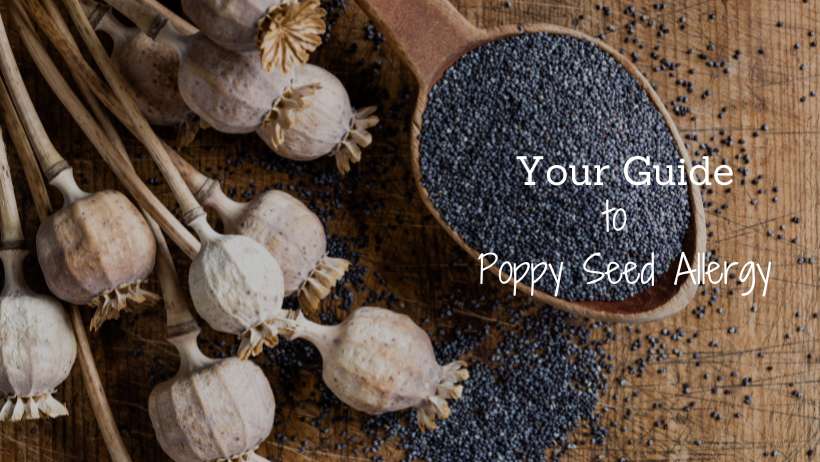Poppy seeds are a common ingredient in baked goods such as cakes, bread, and pastries. They add a unique nutty flavor to food. Poppy oil is also used as an edible oil. While poppy seeds are widely enjoyed, in rare cases, they can trigger allergies. Poppy seed allergies occur when the immune system perceives the protein in poppy seeds as harmful and reacts against it, causing a range of allergic symptoms.

Poppy Seed and Other Associated Allergies
Poppy seed allergies are closely related to other types of allergies. Individuals who are allergic to certain pollens and nuts are at a higher risk of being allergic to poppy seeds. Cross-reactivity between different allergens is common, meaning that people who are allergic to birch, Timothy grass, or mugwort pollen may also develop allergic reactions to poppy seeds.
Similarly, individuals with allergies to rye flour or almonds may be more susceptible to poppy seed allergies. This is due to shared proteins among these allergens that the immune system recognizes as harmful.
In one study, researchers found that cross-reactivity between poppy seeds and other allergens was significant, suggesting that people with known pollen or nut allergies should exercise caution when consuming poppy seeds [Source].
Poppy Seed Allergy Symptoms
The symptoms of a poppy seed allergy can vary widely, ranging from mild oral reactions to severe and potentially life-threatening reactions such as anaphylaxis. Here are some common symptoms associated with poppy seed allergies:
- Swelling of the lips and tongue – Mild swelling around the lips and tongue is often the first sign of an allergic reaction to poppy seeds. This is commonly accompanied by a tingling or itching sensation.
- Itching around the mouth – Itching may occur in and around the mouth shortly after consuming food containing poppy seeds. This symptom is often part of an oral allergy syndrome.
- Hives and Itching – Hives, also known as urticaria, can develop on the skin as red, itchy welts. They can appear anywhere on the body after consuming poppy seeds.
- Vomiting – Some individuals may experience nausea or vomiting in response to a poppy seed allergy.
- Difficulty Breathing – Respiratory symptoms such as wheezing or shortness of breath may occur in more severe cases. This is a sign that the immune system is reacting strongly to the allergen, and immediate medical attention may be required.
In rare cases, poppy seed allergies can escalate to more serious reactions, including anaphylaxis. Anaphylaxis is a life-threatening condition characterized by symptoms such as dizziness, breathlessness, low blood pressure, and loss of consciousness. Immediate administration of epinephrine is required to prevent severe complications [Source].
Prevention and Treatment
The most effective way to prevent a poppy seed allergy is to avoid foods containing poppy seeds altogether. Individuals with known allergies should carefully read food labels to identify hidden sources of poppy seeds. Baked goods like bread, pastries, and cakes often contain poppy seeds, and it is essential to be vigilant while consuming these foods. Additionally, food products cooked with poppy oil should also be avoided, as they can trigger allergic reactions in sensitive individuals.
Testing for Poppy Seed Allergy
Poppy seed allergies can be diagnosed through blood tests and skin prick tests. An allergist can determine if an individual is allergic to poppy seeds by measuring the presence of specific antibodies in the blood or by observing the skin’s reaction to a small amount of the allergen. Once a diagnosis is confirmed, the allergist may recommend strategies for managing the allergy, which could include avoiding certain foods and taking medications to alleviate symptoms.
Treatment of Poppy Seed Allergy Symptoms
For mild reactions, antihistamines are often prescribed to relieve symptoms such as itching, hives, and swelling. Antihistamines work by blocking the effects of histamine, a chemical released during allergic reactions.
In more severe cases, individuals may need to carry an epinephrine auto-injector (EpiPen) to prevent anaphylaxis. Epinephrine works quickly to reverse the symptoms of a severe allergic reaction by narrowing blood vessels and opening the airways. This life-saving treatment must be administered immediately when anaphylaxis is suspected.
Reducing Risks
While it is impossible to eliminate the risk of an allergic reaction entirely, individuals with poppy seed allergies can reduce their risks by practicing the following precautions:
- Reading food labels carefully – Ensure that all food products consumed are free from poppy seeds or poppy oil. This is especially important for pre-packaged foods, where poppy seeds may not be immediately obvious.
- Informing restaurants and bakeries – When eating out, it is essential to inform the restaurant or bakery staff about the allergy. Cross-contamination can easily occur in kitchens, so it is crucial to ensure that the food is free from poppy seeds.
- Carrying emergency medication – Individuals with severe allergies should always carry self-injectable epinephrine in case of accidental exposure. Prompt treatment can prevent life-threatening complications.
- Consulting an allergist regularly – Allergists can provide updated advice on managing food allergies and suggest alternative treatments if needed. Regular consultations help individuals stay informed and prepared.
Conclusion
Although rare, poppy seed allergies can be serious and may even lead to life-threatening conditions like anaphylaxis. Symptoms can range from mild oral reactions to severe respiratory issues. It is essential for individuals with poppy seed allergies to avoid foods that contain poppy seeds and to carry emergency medication if needed.
Through early detection, testing, and proper management, the risks associated with poppy seed allergies can be significantly minimized. Those who suspect they may have a poppy seed allergy should consult with an allergist to determine the best course of action and stay informed about potential triggers in food. By taking preventive measures and being prepared, individuals with poppy seed allergies can lead safe and healthy lives.